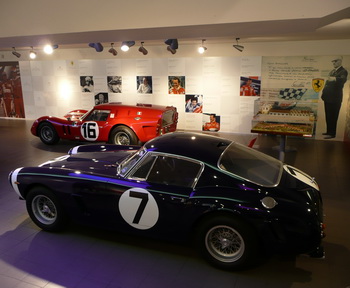 |
|
From this week visitors to the Ferrari
museum can see two examples of the 250 GT:
the Ferrari 250 GT Berlinetta SWB
(competition version) in which Stirling Moss
won four races in 1961 (Silverstone, Brands
Hatch, Goodwood and Nassau), and the
so-called Breadvan. |
|
|
|
There
are certain cars that, because of their rarity and the
role they’ve played in automotive history, simply must
be preserved for posterity. 2012 marks the 60th
anniversary of the Ferrari 250 GT and to celebrate that
milestone, the Ferrari Museum has organised a series of
exhibitions of the most famous cars to bear the 250
moniker. These are the road-going and racing models
which, between 1952 and 1963, sported the famous 3000 cc
V12 engine designed by Gioachino Colombo.
From this week visitors can see two examples of the 250
GT: the Ferrari 250 GT Berlinetta SWB (competition
version) in which Stirling Moss won four races in 1961
(Silverstone, Brands Hatch, Goodwood and Nassau), and
the so-called Breadvan. The 250 GT SWB, which is
finished in the classic blue and white livery of Scot,
Rob Walker, was recently restored by the Ferrari
Classiche department. It was originally built as part of
a chapter in motor racing history that sadly went
unwritten: Enzo Ferrari had reached an agreement to
supply the highly efficient British team with one of his
Formula 1 single-seaters for Moss. Unfortunately, just
before the project was to debut, Moss was involved in a
terrible accident in a Lotus at Goodwood which ended his
racing career. This was the untimely end to a budding
relationship between the two teams that might well have
changed the path of motor sport history and given Moss
the world title he was chasing.
The Breadvan’s story is no less interesting. This is a
berlinetta that is extreme both in terms of its forms
and its technical content. It was commissioned by Count
Volpi di Misurata to compete against the 250 GTO.
Developed by Piero Drogo and Giotto Bizzarrini on the
same running gear as the 250 SWB, the car looked more
like a racing van than a racing car as its square shape
was the result of experimental aerodynamic styling. The
result was that it was quickly dubbed the Breadvan by
the British. Fast but unblessed by fortune, it raced
several times, including at Le Mans. However, Enzo
Ferrari was opposed to it because he would brook no
rivals for his unbeatable 250 GTO.
In 2010, Ferrari awarded the Breadvan the Attestation
for Vehicles of Historic Interest, a document issued for
Ferraris which, although they do not comply with the
strict Ferrari Authenticity Certification criteria, are
deemed to be of historic interest because of their
competition and/or recognised international show
history. The Breadvan is probably the most iconic
example of this kind of car.
|
|
|